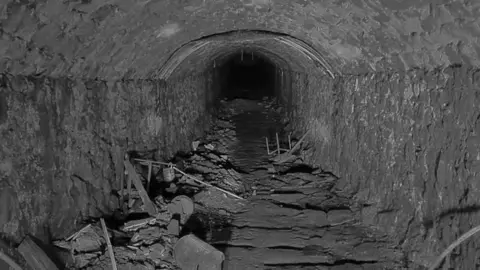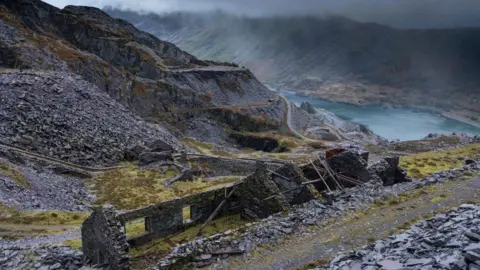Landlord finds hidden tunnel in pub basement
A landlord who found a secret tunnel under his pub hopes it can be used to create a space celebrating the area's cultural heritage.
Robert Bennett made the discovery beneath Yr Heulyn pub, part of Port Dinorwic Marina in Y Felinheli, Gwynedd, which he bought as part of a consortium last year.
The tunnel formed part of a railway that transported slate from the nearby Dinorwic Quarry, once one of the biggest in the world, to the harbour.
"We want to bring back that cultural heritage to the area – make it a working museum in effect," he said.
Mr Bennett, who lives locally and has kept a boat at the harbour for the last eight years, said he had seen the area "declining".
When the previous owners of the marina went into administration, he and a group of investors bought it as part of plans to rejuvenate it.
This has included infrastructure upgrades as well as the opening of Yr Heulyn, a pub which was previously a tapas restaurant on the waterfront.
Looking at old photographs of the area, Mr Bennett said he suspected the old railway ran close to the venue and one afternoon decided to look closer in the venue's basement to "see what we could find".
The group broke through a thick plaster wall, behind which they found the tunnel with "thousands" of discarded bottles in it.
The most recent bottle dated back to 2003, which is when Mr Bennett believes the wall was put up.
 Robert Bennett
Robert BennettSlate has been quarried in north Wales for thousands of years but demand rapidly increased during the Industrial Revolution when it was used for the roofs of factories and workers' homes.
North Wales slate was said to have "roofed the 19th Century world", including prominent buildings such as Westminster Hall and the Royal Exhibition Building in Melbourne, Australia.
Dinorwic Quarry – located on the edge of Eryri National Park, also known as Snowdonia – was once the second largest quarry in the world before it closed in 1969.
Although the tracks were removed, the tunnel had been part of a railway used to transport slate from the quarry to the harbour, where it was either exported or sent around the UK.
 Getty Images
Getty ImagesMr Bennett said the investors were still deciding what to do with the space, but that they wanted to use it to "celebrate the cultural heritage of the area".
"It has potential as a museum, or maybe an extension of the pub – it would be a fantastic spot as a speakeasy pub hidden away, but we haven't got that far yet," he said.
